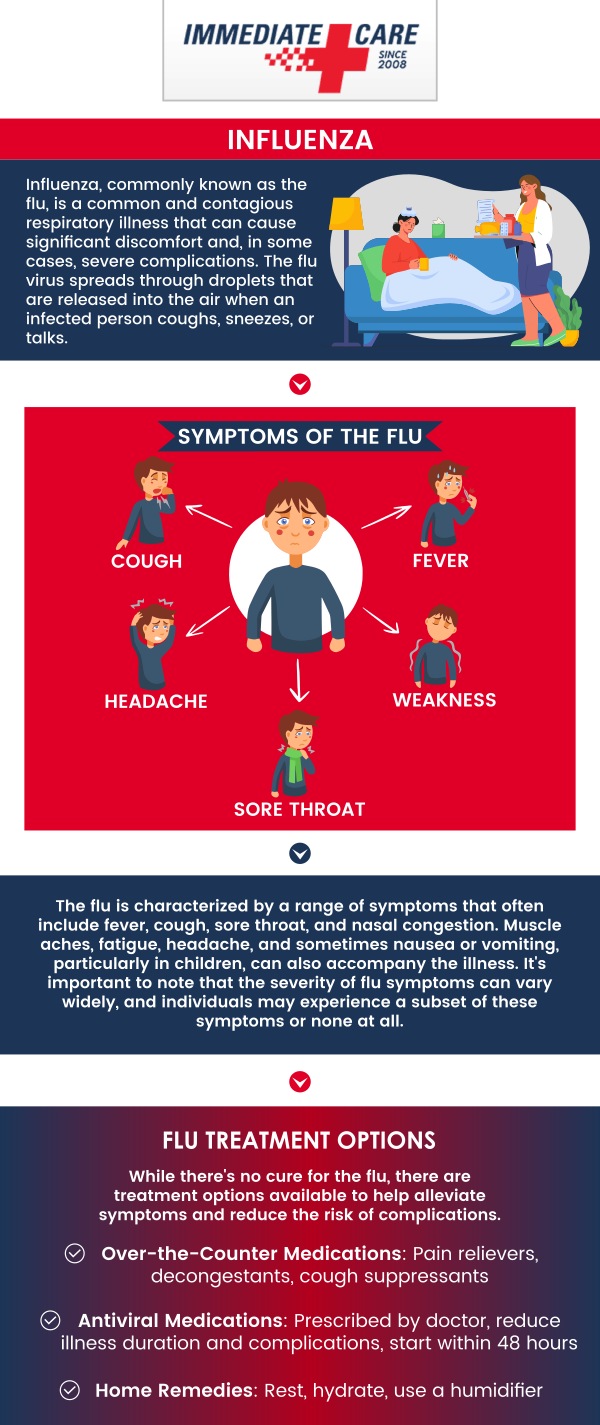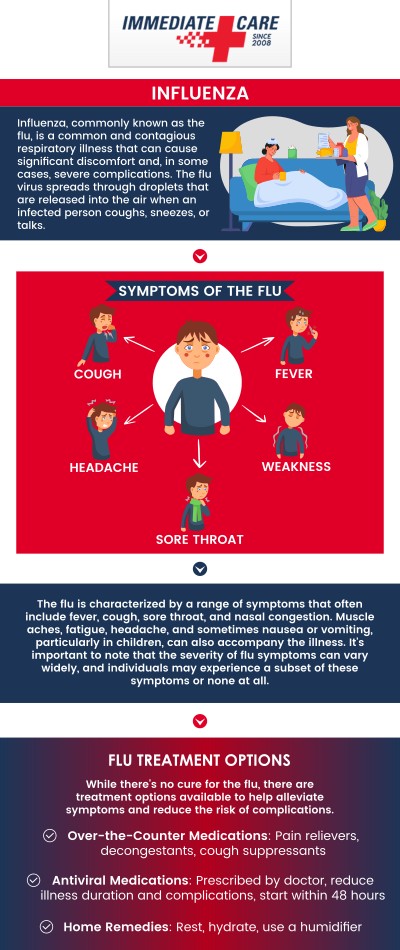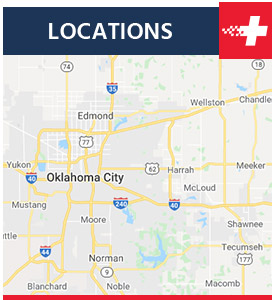Flu (Influenza) Treatment Doctor in Oklahoma City, OK
The flu, a contagious viral infection, targets the respiratory system, leading to symptoms such as fever, cough, sore throat, and body aches. It spreads through airborne droplets and can pose a serious threat, particularly for vulnerable populations like the elderly, young children, pregnant individuals, and those with underlying health conditions. Dr. Kevin Penwell (D.O.), and his team at Immediate Care of Oklahoma offer treatment for flu. For more details, contact us or you can also book an appointment online. We have convenient locations to serve you in Edmond OK, Norman (24th) OK, Norman (HealthPlex) OK, Tecumseh OK, West Moore OK, I-240 and Sooner RD OK, Yukon OK, and Choctaw OK.




Table of Contents:
What should I do if my flu symptoms worsen?
What can a doctor recommend to manage severe flu symptoms?
How long does the flu typically last with treatment?
How to get rid of the flu in 24 hours?
At Immediate Care of Oklahoma, our focus is on you – your health, your comfort, and your peace of mind. If your flu symptoms worsen or persist beyond a few days, you should seek immediate medical attention to prevent further complications. The flu, though often a short-term illness, can quickly advance into a more serious condition if not properly managed.
We are aware of the significance of maintaining hydration, particularly in the event of flu-like symptoms including fever, sweating, and vomiting. We recommend our patients to consume plenty of water and electrolyte-rich fluids to maintain their fluid balance.
Rest is also an important aspect of healing. Your body requires energy to fight off the flu virus, and getting adequate sleep helps. We advise our patients to avoid strenuous physical activity and prioritize sleep as part of their recovery.
As your healthcare partner, we strongly believe in monitoring your symptoms. High fever, severe body aches, chest discomfort, or a persistent cough are signs of potential complications such as pneumonia. Similarly, a severe cough with green, yellow, or blood-tinged phlegm, difficulty breathing, mental confusion, bluish lips or nails, increased heart rate at rest, severe muscle aches, and persistent abdominal pain are also alarming symptoms.
While over-the-counter medication can help manage your symptoms, they should be used as directed and not for extended periods. If your symptoms continue to worsen despite your best efforts, our healthcare professionals at Immediate Care of Oklahoma are ready to evaluate your condition, determine if further treatment or testing is necessary, and recommend appropriate measures to alleviate your symptoms.
When dealing with the flu, it’s always better to be cautious. If your symptoms worsen or don’t improve, don’t wait. Contact our healthcare professionals for immediate care and support.
At Immediate Care of Oklahoma, we are committed to providing comprehensive medical care for a multitude of conditions, including severe flu symptoms. Our team of experienced healthcare professionals is equipped to handle your needs and help you manage your condition effectively.
● Hydration and Rest: We underscore the importance of staying hydrated and well-rested when dealing with severe flu symptoms. Drinking clear fluids and getting ample sleep can help your body combat the virus more effectively.
● Medications: Our trained medical staff can assess your condition and prescribe appropriate antiviral medications, fever reducers, pain relievers, cough suppressants, expectorants, and nasal decongestants.
● Additional Recommendations: Our doctors also recommend using a humidifier and consuming fluids with electrolytes to alleviate your discomfort and replenish lost minerals.
● Preventive Measures and Emergency Situations: We strongly advise our patients to get the annual flu vaccine as a preventive measure. We also provide guidance on how to avoid contact with others to prevent the spread of the virus.
We offer immediate medical attention in emergencies that might arise due to severe flu symptoms. If you are having difficulty breathing, experiencing chest pain, or becoming confused, please seek medical attention at our facility.
In severe circumstances, hospitalization may be necessitated particularly for people with compromised immune systems, the elderly, or those with chronic conditions. We are here to provide the necessary assistance and support during such critical times.
Influenza, commonly known as the flu, can be a serious issue for many people. This respiratory illness, caused by influenza viruses, can vary in duration based on the individual and the specific strain of the virus.
● Duration with Treatment: If you come into one of our locations within 48 hours of the onset of your flu symptoms, we can administer antiviral medications. These treatments can reduce the duration of the flu by one to two days. Symptoms generally subside within a few days of starting the treatment. These medications can also help prevent serious complications from the flu, such as pneumonia. However, it’s important to note that full recovery from the flu can still take a couple of weeks, even with treatment.
● Duration without Treatment: Without treatment, the flu generally lasts for about 5-7 days. Symptoms might peak 2-3 days after you first notice them, and then they slowly start to subside over several days.
● Influenza A vs. Influenza B: Influenza A infections can last a bit longer (7-10 days) than Influenza B infections (5-7 days).
● Factors Affecting Duration: The length of your illness can be influenced by several factors. These include your age, any underlying health conditions you might have, the strain of the flu virus, and when you started treatment. Children, the elderly, and those with chronic diseases or compromised immune systems often experience more severe and longer-lasting symptoms. If these people feel they have the flu, they should seek medical assistance right once.
Here are some helpful strategies that we recommend for speeding up recovery from flu symptoms:
● Rest Adequately: When fighting the illness, getting enough rest is critical. Your body requires energy to fight the virus, so get at least 8-10 hours of sleep every night.
● Maintain a Healthy Diet: A balanced diet can help your body’s immune system fight off the illness. Incorporating protein-rich foods, garlic, and honey into your meals can be beneficial, and try to avoid processed foods.
● Use Over-The-Counter Medications: Over-the-counter medications can help alleviate flu symptoms.
● Consider Antiviral Drugs: If necessary, our doctors can prescribe antiviral drugs to help reduce the severity of the flu and speed up recovery.
● Humidify Your Environment: To combat dry throats and sinuses, try humidifying the air around you. A humidifier or a relaxing hot shower can help alleviate these symptoms and provide comfort.
● Practice Preventive Measures: Protect yourself and others from the flu by avoiding close contact, covering your coughs and sneezes, and washing your hands regularly. Taking these simple precautions can help limit the transmission of the virus.
Although these steps can help alleviate symptoms and support faster recovery, the flu usually runs its course over several days. Seek medical care if your symptoms intensify or you are at high risk for problems.
Remember, everyone’s body responds differently to the flu, and it might require more than 24 hours for your body to recover. Our team at Immediate Care of Oklahoma is here to support you throughout your recovery process. For more information, contact us or schedule an appointment online. We serve patients from West Moore OK, Norman (HealthPlex) OK, Norman (24th) OK, Edmond OK, Yukon OK, I-240 & Sooner RD OK, Tecumseh OK, Bethany OK, Choctaw OK, and surrounding areas.


Additional Services You May Need
▸ Urgent Care Services
▸ Illness + Injuries
▸ On Site Lab + X-Ray
▸ Helpful Health
▸ Motor Vehicle Accidents
▸ Drug Testing
▸ MRO
▸ UTI Treatment
▸ Employment Physicals
▸ Workers Comp
▸ Strep Throat Treatment
▸ Pregnancy Testing
▸ Blood Pressure Testing
▸ Urinalysis
▸ Mononucleosis Treatment
▸ Suture Removal
▸ Respiratory Syncytial Virus
▸ OccMed








